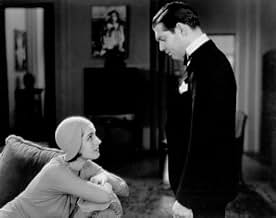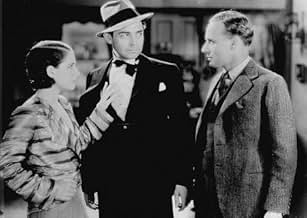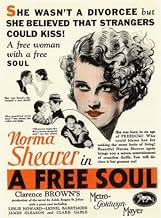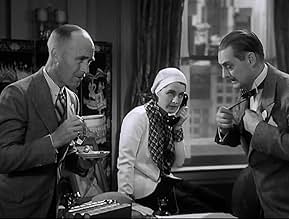VALUTAZIONE IMDb
6,6/10
3109
LA TUA VALUTAZIONE
Un avvocato alcolizzato che ha difeso con successo un famigerato giocatore d'azzardo con l'accusa di omicidio si oppone quando sua figlia dallo spirito libero viene coinvolta sentimentalment... Leggi tuttoUn avvocato alcolizzato che ha difeso con successo un famigerato giocatore d'azzardo con l'accusa di omicidio si oppone quando sua figlia dallo spirito libero viene coinvolta sentimentalmente con lui.Un avvocato alcolizzato che ha difeso con successo un famigerato giocatore d'azzardo con l'accusa di omicidio si oppone quando sua figlia dallo spirito libero viene coinvolta sentimentalmente con lui.
- Regia
- Sceneggiatura
- Star
- Vincitore di 1 Oscar
- 4 vittorie e 2 candidature totali
Roscoe Ates
- Man Shot at in Men's Room
- (non citato nei titoli originali)
Ann Brody
- Hamburger Saleslady
- (non citato nei titoli originali)
Edward Brophy
- Slouch
- (non citato nei titoli originali)
Clarence Burton
- Detective
- (non citato nei titoli originali)
James Donlan
- Reporter
- (non citato nei titoli originali)
Bess Flowers
- Birthday Party Guest
- (non citato nei titoli originali)
Francis Ford
- Skid Row Drunk
- (non citato nei titoli originali)
Henry Hall
- Detective in Raid
- (non citato nei titoli originali)
George Irving
- Johnson - Defense Attorney
- (non citato nei titoli originali)
Edward LeSaint
- Judge
- (non citato nei titoli originali)
Eric Mayne
- Party Guest
- (non citato nei titoli originali)
Sam McDaniel
- Casino Valet
- (non citato nei titoli originali)
Recensioni in evidenza
Having just seen the Free Soul (1931), I was struck with how much Gable's character foretold his similarly famous role as Rhett Buttler in the 1939 film, Gone with the Wind. The plot situations in the two movies were also very similar, a different time and setting. I noticed the role of the fathers were almost identical. Barrymore's patriarchal role was just as intense as Scarlet's father. Norma Shearer's free soul character was similar but more understandable and empathetic than Scarlet's continuous self-centeredness. The coincidence of the similarity of Leslie Howard's role in both films as the jilted lover was striking. His acting got a lot better in Gone with the Wind. It was easy to see how Gable was destined to be somebody based on his performance in the 1931 film. I found viewing A Free Soul while comparing it to the more famous Civil War movie was an enjoyable experience.
Norma Shearer slinks and giggles her way through another melodrama, this one noted for not only her but the presence of Lionel Barrymore, Clark Gable and Leslie Howard.
Not a bad cast, eh?
The story has a lot to it, too - too much to go into here. It's basically a father-daughter story with the daughter having a good guy and a bad guy both after her, and her taking in all the attention she can get. I've only seen two Norma Shearer films but she played a similar character in both. She's likes to giggle, show off her body and flirt but doesn't want commitments. (The Divorcée was the other film in which I saw her.) For much of this film, this is a gender-reversal with the woman being the "heel."
Barrymore plays her dad, an alcoholic defense attorney. If, for nothing else in this movie, he's remembered for his impassioned speech at the end of the trial. It WILL get your attention! Clark Gable plays the toughie and Howard plays the suave nice-guy both vying for Shearer's love.
There is truth to a number of things in this film such as "Jan Ashe" (Shearer) finding the not-so-nice guy more "exciting" over a genuine gentleman. Why many women are like that - preferring the grubby-looking thug - who knows, but Shearer is good at playing that role. Shearer's Harlow-like attire and no-bra look got my (and Gable's) attention, too.
The movie should be enjoyed by most who like this kind of a melodrama and/or appreciate good acting and a bit of star-gazing.
Not a bad cast, eh?
The story has a lot to it, too - too much to go into here. It's basically a father-daughter story with the daughter having a good guy and a bad guy both after her, and her taking in all the attention she can get. I've only seen two Norma Shearer films but she played a similar character in both. She's likes to giggle, show off her body and flirt but doesn't want commitments. (The Divorcée was the other film in which I saw her.) For much of this film, this is a gender-reversal with the woman being the "heel."
Barrymore plays her dad, an alcoholic defense attorney. If, for nothing else in this movie, he's remembered for his impassioned speech at the end of the trial. It WILL get your attention! Clark Gable plays the toughie and Howard plays the suave nice-guy both vying for Shearer's love.
There is truth to a number of things in this film such as "Jan Ashe" (Shearer) finding the not-so-nice guy more "exciting" over a genuine gentleman. Why many women are like that - preferring the grubby-looking thug - who knows, but Shearer is good at playing that role. Shearer's Harlow-like attire and no-bra look got my (and Gable's) attention, too.
The movie should be enjoyed by most who like this kind of a melodrama and/or appreciate good acting and a bit of star-gazing.
Johnny Cochrane must've learned some legal tricks from this old movie. For example, at the beginning of the movie, Lionel Barrymore gets Clark Gable acquitted of first degree murder when he places the hat found at the scene of the crime on Clark's head ... clearly the hat is too small. The court and jury laugh, and Clark is set free!
This entire movie was great -- much better than I had expected. I saw two Norma Shearer movies recently with a similar-sounding plot recap: Their Own Desire (Norma Shearer falls for the son of her father's illicit lover), and this one, A Free Soul (Norma Shearer falls for her lawyer father's mobster client). Having watched Their Own Desire first and not being impressed with it, I wondered if I should even bother with A Free Soul. But bother I did, and I'm glad for it. It was an excellent movie.
Lionel Barrymore is the black sheep of his snooty, well-heeled family. His wife died while giving birth to their only child, Jan (Norma Shearer). Being the black sheep, Lionel raised Norma to be a "free soul", to not be afraid of anyone or anything, to not be afraid to make mistakes, and to pick herself up and dust herself off whenever she did find herself in trouble. This has apparently worked well for Norma, until she meets and eventually tries to get away from Clark Gable. Norma finally learns there are consequences to all actions, that one can't be a "free soul" without it having some type of repercussion on one's life.
We also have Lionel Barrymore (whom I always love in anything I see him in) this time very compelling as a brilliant alcoholic lawyer who loves his daughter more than anything but who ultimately doesn't know how to protect her. He disappoints her, and he disappoints himself, but in the end he seeks to right his wrongs by defending Norma's ex-fiancé (to say more would be to possibly spoil the movie).
This movie was fresh, and the characters were sympathetically developed without ever resorting to being maudlin or melodramatic. This movie was also chock-full of great lines. For example:
(Lionel to Clark, upon learning Clark wants to marry Norma) - "The only time I hate democracy is when one of you mongrels forgets where you belong!"
(Norma to Clark, trying to get Clark to quit talking and make love to her) - "Men of action are better in action; they don't talk well."
Great early pre-code movie.
This entire movie was great -- much better than I had expected. I saw two Norma Shearer movies recently with a similar-sounding plot recap: Their Own Desire (Norma Shearer falls for the son of her father's illicit lover), and this one, A Free Soul (Norma Shearer falls for her lawyer father's mobster client). Having watched Their Own Desire first and not being impressed with it, I wondered if I should even bother with A Free Soul. But bother I did, and I'm glad for it. It was an excellent movie.
Lionel Barrymore is the black sheep of his snooty, well-heeled family. His wife died while giving birth to their only child, Jan (Norma Shearer). Being the black sheep, Lionel raised Norma to be a "free soul", to not be afraid of anyone or anything, to not be afraid to make mistakes, and to pick herself up and dust herself off whenever she did find herself in trouble. This has apparently worked well for Norma, until she meets and eventually tries to get away from Clark Gable. Norma finally learns there are consequences to all actions, that one can't be a "free soul" without it having some type of repercussion on one's life.
We also have Lionel Barrymore (whom I always love in anything I see him in) this time very compelling as a brilliant alcoholic lawyer who loves his daughter more than anything but who ultimately doesn't know how to protect her. He disappoints her, and he disappoints himself, but in the end he seeks to right his wrongs by defending Norma's ex-fiancé (to say more would be to possibly spoil the movie).
This movie was fresh, and the characters were sympathetically developed without ever resorting to being maudlin or melodramatic. This movie was also chock-full of great lines. For example:
(Lionel to Clark, upon learning Clark wants to marry Norma) - "The only time I hate democracy is when one of you mongrels forgets where you belong!"
(Norma to Clark, trying to get Clark to quit talking and make love to her) - "Men of action are better in action; they don't talk well."
Great early pre-code movie.
A Free Soul (1931)
Clark Gable says, "I'm telling you." And Norma Shearer, dressed in a sexy silk dress, replies, "Oh no, you're not. Nobody is."
That sums up this astonishing movie. I can't believe A Free Soul is so little known, or that so many viewers don't get the depth of its meaning then...and now. Throw in three of the most amazing actors of the early 1930s--Lionel Barrymore, Clark Gable, and Norma Shearer--and you can't help be impressed, and moved, and intrigued. It's about strength of character (three or four characters, in fact). It's about being a modern person, and having modern problems. And it's about facing them, openly, honestly.
So what holds it back? Well, for one thing, it has a lot of talk, a lot of simple dialog about some very not simple things. If you accept the characters and their need to talk, you will see a very honest confrontation with alcoholism, and with what is at first a kind of sex addiction, or what is later developed to be simply unbridled love for a man outside of marriage. But the parallel between two temptations is real, and rather powerful, and the sacrifices each of the two afflicted characters make is intense. Barrymore (as the one nipping the bottle) and Shearer (as the one too much in love, or in love with lovemaking) play their parts perfectly. They have moments of extraordinary clarity, and moments of abandonment. And they confront each other in a way that is completely reasonable.
There are other aspects here worth at least lifting an eyebrow at, namely the very close relationship, almost as platonic lovers, between these two. Gable as a lovable but brutal and deceptive gangster is perfect, too--gorgeous and hard, charming and untrustworthy. The milieu is well developed, from barroom to hotel room to courtroom. This isn't a Warner Brothers knock-you-out crime film, it isn't even Three on a Match, for an example of a compromise between a woman's picture and a gangster flick. It's a heady drama, beautifully laid out and progressively involving, with director Clarence Brown (famous for a whole string of such interpersonal, romantic dramas over several decades) knowing what makes a film really matter.
Clark Gable says, "I'm telling you." And Norma Shearer, dressed in a sexy silk dress, replies, "Oh no, you're not. Nobody is."
That sums up this astonishing movie. I can't believe A Free Soul is so little known, or that so many viewers don't get the depth of its meaning then...and now. Throw in three of the most amazing actors of the early 1930s--Lionel Barrymore, Clark Gable, and Norma Shearer--and you can't help be impressed, and moved, and intrigued. It's about strength of character (three or four characters, in fact). It's about being a modern person, and having modern problems. And it's about facing them, openly, honestly.
So what holds it back? Well, for one thing, it has a lot of talk, a lot of simple dialog about some very not simple things. If you accept the characters and their need to talk, you will see a very honest confrontation with alcoholism, and with what is at first a kind of sex addiction, or what is later developed to be simply unbridled love for a man outside of marriage. But the parallel between two temptations is real, and rather powerful, and the sacrifices each of the two afflicted characters make is intense. Barrymore (as the one nipping the bottle) and Shearer (as the one too much in love, or in love with lovemaking) play their parts perfectly. They have moments of extraordinary clarity, and moments of abandonment. And they confront each other in a way that is completely reasonable.
There are other aspects here worth at least lifting an eyebrow at, namely the very close relationship, almost as platonic lovers, between these two. Gable as a lovable but brutal and deceptive gangster is perfect, too--gorgeous and hard, charming and untrustworthy. The milieu is well developed, from barroom to hotel room to courtroom. This isn't a Warner Brothers knock-you-out crime film, it isn't even Three on a Match, for an example of a compromise between a woman's picture and a gangster flick. It's a heady drama, beautifully laid out and progressively involving, with director Clarence Brown (famous for a whole string of such interpersonal, romantic dramas over several decades) knowing what makes a film really matter.
They are alike, this father & daughter. Liberal, passionate, willful - they live life on their own terms, disdaining their narrow-minded relations. Few regrets & even fewer apologies cloud either conscious - yet each harbors a character trait that threatens to destroy them. Hers is emotional instability; his, acute alcoholism. Although both will make bad choices that will haunt them, each will continue to see their reflection in the other, unique & individual, A FREE SOUL.
Based on a book by Adela Rogers St. Johns, Norma Shearer gets top billing in this aged but enjoyable soap opera, and she is very good, turning on the histrionics most effectively. But it is Lionel Barrymore who gets full honors - and a Best Actor Oscar - for his portrayal of her brilliant, tragic, lawyer father. Masterfully, he dominates his every scene. His final appearance, a tempestuous summation to a murder trial jury, is considered a classic.
Playing the two very different men in Shearer's life are Clark Gable & Leslie Howard. Gable is excellent, oozing the virility that was about to make him a huge star. Howard deftly underplays his less flashy role and becomes the film's calm center. James Gleason as Barrymore's factotum, and Lucy Beaumont as Barrymore's patrician mother, both give memorable performances. Film mavens will spot Edward Brophy as one of Gable's henchmen & master stutterer Roscoe Ates as the man in the washroom window.
Based on a book by Adela Rogers St. Johns, Norma Shearer gets top billing in this aged but enjoyable soap opera, and she is very good, turning on the histrionics most effectively. But it is Lionel Barrymore who gets full honors - and a Best Actor Oscar - for his portrayal of her brilliant, tragic, lawyer father. Masterfully, he dominates his every scene. His final appearance, a tempestuous summation to a murder trial jury, is considered a classic.
Playing the two very different men in Shearer's life are Clark Gable & Leslie Howard. Gable is excellent, oozing the virility that was about to make him a huge star. Howard deftly underplays his less flashy role and becomes the film's calm center. James Gleason as Barrymore's factotum, and Lucy Beaumont as Barrymore's patrician mother, both give memorable performances. Film mavens will spot Edward Brophy as one of Gable's henchmen & master stutterer Roscoe Ates as the man in the washroom window.
Lo sapevi?
- QuizWhen the mule chases James Gleason, not a stuntman, is knocked down by the animal, a scene which wasn't planned, as Norma Shearer's reaction attests.
- BlooperAfter the cross-examination finishes, Stephen Ashe begins his summation to the jury. However, he is the defense attorney, and the prosecutor takes the first summation. This "factual mistake" is, in fact, not an absolute, as it depends on the state where the trial is held. For example, in a criminal case (which this is) in the Commonwealth of Pennsylvania, the defense goes first and the Commonwealth last. (If it were a civil case in PA, the Plaintiff would go first.)
- ConnessioniFeatured in Some of the Best (1944)
- Colonne sonoreBy the River Sainte Marie
(1931) (uncredited)
Music by Harry Warren
Played as background music during the restaurant scene
I più visti
Accedi per valutare e creare un elenco di titoli salvati per ottenere consigli personalizzati
- How long is A Free Soul?Powered by Alexa
Dettagli
- Data di uscita
- Paese di origine
- Lingua
- Celebre anche come
- Un alma libre
- Luoghi delle riprese
- Yosemite National Park, California, Stati Uniti(Jan, her father and Eddie go camping)
- Azienda produttrice
- Vedi altri crediti dell’azienda su IMDbPro
Botteghino
- Budget
- 529.000 USD (previsto)
- Tempo di esecuzione1 ora 33 minuti
- Colore
Contribuisci a questa pagina
Suggerisci una modifica o aggiungi i contenuti mancanti






































